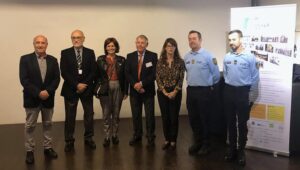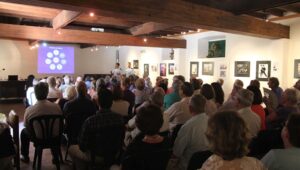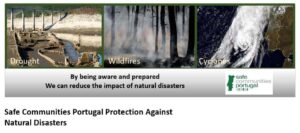
By David Thomas
The My GNR programme was announced through a GNR press release in August 2012. The initiative arose during meetings between Safe Communities Algarve and the GNR primarily aimed at further enhancing police/community co-operation therefore helping to keep the Algarve a safe place to live and visit. My GNR reflects the concept of the police being part of society and engages public support in preventing crime.
The My GNR programme, which uses an interactive map on the Safe Communities Algarve website (www.safecommunitiesalgarve.com) is the first of its kind in Portugal and brings together six features divided into the main GNR geographical areas in the Algarve, which residents can easily access.
The features are: details of the Programa Residência Segura (Safe Residence Programme), including how to join the programme and contact details; details of the areas covered by GNR divisions; contact details of all GNR stations with an online link showing the location map of each station; an operations page showing details of recent GNR arrests in each area and ‘News and Downloads’, which contains the latest GNR news, events and downloads in each area.
Perhaps the most important feature of My GNR is a section called “Eyes and Ears”, which is where you can report suspicious activity online directly to the GNR.
Simply by going to the interactive map under My GNR, you click on the area you live and then click on the box “Eyes and Ears”. This then explains its purpose with examples, and by clicking on the “Click Here” tab you can type in your message. Work is underway to improve navigation to make “Eyes and Ears” more directly accessible to users.
Why should I bother to report suspicious activities?
The answer to this is simple: if you do not you may be putting yourself, your family and your neighbours at risk. Many crimes have been prevented as a result of such information and the culprits brought to justice.
Towards the end of 2012, a series of burglaries and robberies in Loulé committed by a gang was brought to a halt in part because someone noticed something suspicious and reported it. The GNR acted upon it and this led to those responsible being arrested. Without that information the gang would undoubtedly have committed more crimes and could even be still at large.
What happens when you report suspicious activities?
If you report suspicious activity through “Eyes and Ears” or by telephoning the GNR, you may not receive an acknowledgement (which is something that is being worked on), BUT I can assure you that the information is acted upon as appropriate.
Information received through “Eyes and Ears”, as with any report of suspicious activities to the GNR, is recorded and examined to see whether it helps build upon an existing investigation and/or helps prevent a crime from taking place.
This information is shared between various GNR units, including of course their criminal investigation units, and with the PSP and PJ as necessary. Unlike some police forces in certain countries, I have seen much more willingness here to share information – perhaps it is the culture.
The sharing process is now being enhanced by a new computer programme which connects police forces and units within the country, specifically to build intelligence through the developing of information from various sources.
Certainly anyone listening to the Portuguese news and/or reading newspapers and SCA bulletins will see that in recent months a number of criminal groups have been neutralised.
How effectively is “Eyes and Ears” being used?
Every week I receive several enquiries from residents concerning the action they should take in respect of suspicious activities they have seen, or in some cases whether they should report a crime where they have been the victim. Undoubtedly, there are many more that are reported directly to police.
This is heartening as it means that people are becoming more aware of security in their area and would like to pass this on, but more work needs to be done in particularly encouraging those who are a victim of crime to do so. In most of these cases, the advice I have given is either to contact the GNR Safe Residence Programme team if in place in the area concerned, report to the nearest police station or through “Eyes and Ears”. In almost all cases this is done.
During the last month, there has been an increase in these enquiries and I would like to give some brief examples: (i) Resident reported suspicious stickers on her house; (ii) in Tavira a report was received of dubious charity collectors; (iii) a con man possibly operating in Algarve shopping area; (iv) an email scam; (v) gypsies suspected of theft in Boliqueime; (vi) Vale do Lobo – persons acting suspiciously; (vii) suspected criminals making owl like sounds in the Eastern Algarve; (viii) barking dogs; (ix) suspicious people selling security alarms; (x) Algoz – reports of doorstep sellers of telecom equipment asking for water; (xi) two possible deception cases.
Reporting crime
And then there is the crime side. There have been several enquiries from residents who have been victims of crime and whether they should report this. In one of these cases, the victim had in fact vital evidence, the type of which often results in culprits being arrested, but had to be persuaded to report the crime as it could take two to three hours at the police station.
We all know that visiting a police station is not something people like to do and, yes, it may be time-consuming, but look upon it like this, by taking this important step you may be preventing someone else becoming a victim of crime.
So please make use of “Eyes and Ears” together with other means of reporting suspicious activities. Crime and suspicious activities that need to be treated urgently should always be reported by telephoning the police or visiting the nearest police station.
Finally
By reporting suspicious activities you are doing your part in maintaining the Algarve as a safe place to live and visit. When you make the report, you may not always receive a reply from the police unless they need further information. This does not mean, however, nothing is happening, but simply because the details of investigations are not divulged publically.
This maintains a degree of confidentiality, reducing the opportunity for the culprits to be alerted and take evasive action. If when reporting suspicious activity you have any complaint in the way in which it has been handled, this can be raised with the station commander or by contacting Safe Communities Algarve who will take it up with the authority concerned.
||features@algarveresident.com
David Thomas is a former Assistant Commissioner of the Hong Kong Police, consultant to INTERPOL and the United Nations Office on Drugs and Crime. In October 2011 he formed Safe Communities Algarve an on-line platform here in the Algarve to help the authorities and the community prevent crime.
913 045 093 | www.facebook.com/scalgarve


















